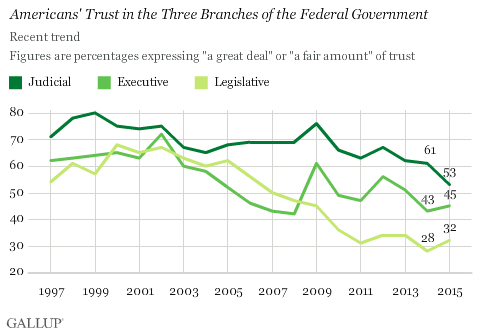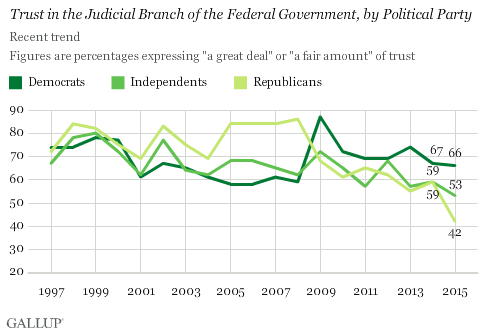Another hodge-podge related to the 2016 campaign:
-
An Embarrassment of Riches. The author looks at the consequences of the increased amount of money spend on the campaign - especially on Republicans - and wonders if it has led to fragmentation and a further weakening of party organizations. He suggests, ironically, that increased spending on the Republican side might actually benefit Democrats.
-
The GOP Is Killing Itself. This was written by a Republican commentator - Peter Wehner - who is concerned about how the party is being impacted by the "outsider" candidates, especially Trump and Carson, who may be positioning the party too far outside the mainstream to win general elections.
-
Why Republicans are starting to panic, in 1 paragraph. The author provides comment on the article listed above. Here is the paragraph from it he refers to:
The message being sent to voters is this: The Republican Party is led by people who are profoundly uncomfortable with the changing (and inevitable) demographic nature of our nation. The GOP is longing to return to the past and is fearful of the future. It is a party that is characterized by resentments and grievances, by distress and dismay, by the belief that America is irredeemably corrupt and past the point of no return. “The American dream is dead,” in the emphatic words of Mr. Trump.
He provides data that shows that the Republican Party is increasingly becoming the "white" party just about the time that the share of the electorate that is Anglo is declining. He joins the previous author - along with many other commentators - in wondering how the party can win national elections as a result.
-
Walker's campaign manager unloads. Here's a great opportunity to look - after the fact - at the operations inside a presidential campaign - a failed one to be sure, but those are just as good as the successful ones for a look at how elections are won and lost. The campaign manager was a man named Rick Wiley -
click here for info on him.
Here's a juicy part of the story - due to poor performance on the national state, funds just dried up:
By Wiley’s telling, the end came fast. “June and July, up through that first debate, were good, fundraising-wise — really good,” he said. "Hitting your numbers. And we thought maybe we could even project [that] outward, like tick our numbers up a little bit. And then the [Aug. 6] Cleveland debate happened. ... The press corps wrote that he didn't help himself but didn't hurt himself. But the didn't-help-himself narrative took over. And fundraising started to go down.”
The problems snowballed, all self-inflicted. “The week after the debate, our events fell a little bit flat,” Wiley said. “And so then we roll into the Iowa State Fair, and the ‘birthright citizenship’ [gaffe] came up. And that was another one where the donors were like, ‘What's going on over there?’”
After five weeks, it was clear: Madison, we have a problem. “It culminated with a trip through Texas, the three days leading up to Labor Day weekend, where ... we're supposed to raise half a mil and we brought in $184K,” Wiley said. “That, coupled with we were in the mail with [a] mailing to our donors, and that was the first time that [an internal] file had lost money. ... So, at that point, we can say, ‘OK, we have a huge revenue problem.’”
-
What Happens To All That SuperPAC Money When A Candidate Drops Out? Apparently there is no law stating what must happen to it, but the money that went to the SuperPACs that backed Rick Perry has gone back to the donors.
-
Scott Walker, Rick Perry show limits of super PACs: Turns out, billionaires can’t buy the White House. Perhaps all that concerns over SuperPACs and the influence of money on the presidential campaign were overstated.
His [Scott Walker's] withdrawal from the GOP primary ― like that of former Texas Gov. Rick Perry earlier this month ― highlights the limitations of the new strain of megadonor-subsidized presidential politics. Big-money outside groups devoted to the two failed candidates combined to raise more than $43 million through the end of June. But when they began looking for ways to spend the bounty to boost their respective candidates’ flagging poll numbers, their efforts were complicated by tricky election laws, quirky debate qualification rules and the unpredictable rise of Donald Trump as the GOP primary leader.





